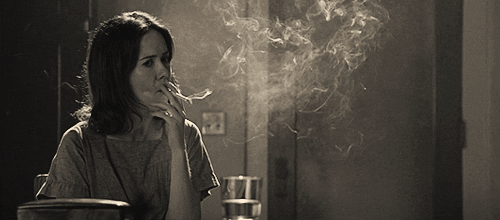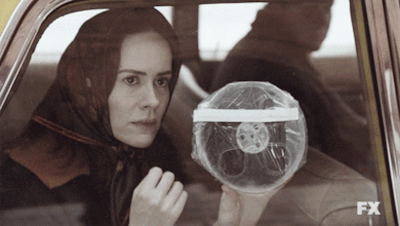Author's Note: I set to write about the superb character that is Lana Winters in American Horror Story before the season was over. What is so spectacular about American Horror Story is that each season is self-contained, without the risk of spinning wildly out of control. I could have waited, yet I didn't Now that the season is over, I’ve gone back and added to this, but my opinion has not changed.
Here are a few praises hailing Lana Winters, played by Sarah Paulson.

gif by snowwhitebemberg on Tumblr
I am a far cry from Ryan Murphy’s biggest fan. I gave up on Glee after a long struggle with his sloppy writing and contradictory characterization, and I have barely held on to The New Normal for the sake of a cast that I’m fond of, in spite of it's frankly masturbatory nature. That said, I have held on tightly to American Horror Story. It seems that, in spite of Ryan Murphy, this show has succeeded in being quality television. Some would argue that it’s not, based on a few key flaws, but I’m not here to defend American Horror Story so much as praise one of the new seasons main characters, Lana Winters.
I would go as far as to say that Lana Winters is one of the best characters on TV today.
This is in part thanks to Sarah Paulson’s incredible acting, relaying the story of a strong woman going through hell and remaining, throughout it, sane. Appropriately traumatized to the point that she cannot physically allow the baby she will loathe to be aborted, because she can’t open her legs far enough, can’t keep from being loud, and can’t stop imagining all the death she’s seen. Traumatized, but sane. With Sarah Paulson’s skill, we really feel the truth behind her emotions. This makes her relatable in ways that the writing of her story would not be able to do on it’s own, with a less sufficient actress at the helm.
What is truly spectacular about Lana Winters, beyond the pure chops of Sarah Paulson, is that she is not a stereotype.
Last season, we were presented with a cast of characters all cut out of a very unified mold: the residents of a rich Los Angeles neighborhood. While they were (mostly) all different, individually interesting characters, they all had elements of that tricky little writing tool that Ryan Murphy tends to fall into: namely, character typing. We have the bigoted older southern belle, the psychopathic romantic interest, the misunderstood teenager and the sexually diverse gay couple who don’t avoid stereotypes so much as slide comfortably into them. His characters are often a sloppy cut-and-paste job from TVTropes. We can safely say that season 1, with it's aimless focus and squeaky wheels, was a test run for ideas and artistic license. We see many of these tropes again in season 2 ( see the Nazi Doctor Arden for your bigoted older gentleman, or Axe Murderer Grace for your psychopathic love interest—one that subsequently gets turned on its head quite interestingly), but one character really seems to pull away from the mold: that of our Heroine, Lana Winters.
When we were first presented with a strong, gay, female reporter, I was wary for a few reasons. My first concern was for her longevity. American Horror Story has proven that the writers have no qualms against being cruel for the sake of a deeply disturbing and theme-appropriate story. While this is a daring and wonderful quality for a television show, given how driven today’s media is to please the fans, it sets the viewer up not to have hope. It seemed inevitable that she would be sullied in some way, or sacrificed to the gears of plot for the sake of Kit and Sister Jude, the show’s headliners. A second concern I had, and a much more major one at that, was how Ryan Murphy would handle her. Despite being a gay man himself, his track record for writing gay characters who don’t rely on their sexuality as a defining characteristics is rather poor. Kurt Hummel, originally a uniquely individual character, has become a series of statements on gay rights without much concern for any other aspect of his life. He is gay, and that is why he exists. Oddly enough, that was the first critique of Kurt given to me long ago that made me begin to see the light and release my tight grip on the show. The same can be said about the Zachary Quinto’s character in the first season of American Horror Story, whose plot is entirely based on his relationship, and of course is also the case with the entire working premise of The New Normal. More often than not, Ryan Murphy’s gay characters are defined by their homosexuality.
On top of all of this Lana is also a woman, and I don’t trust Ryan Murphy’s shows to pass the Bechdel test on a regular basis. There are numerous articles about how poorly Ryan Murphy writes female characters, so I won’t go into that so much here. What I will talk about is lesbians. While the negative treatment of gay women by gay men is a massive stereotype in its own, Ryan Murphy feeds into stereotypes very often. His own character, Bryan Collins of The New Normal, is essentially a a representation of Ryan Murphy himself, and a very campy, occasionally over the top one at that. Bryan can really be used as a reflection of how Ryan Murphy sees himself, and it doesn't bode well for his opinion of lesbians; Bryan's opinion of lesbians feeds directly into the stereotype. This leads me to believe that Lana, being a lesbian, would not be treated or depicted fairly, but rather through the stereotypical lens of a gay man.
So I worried about Lana. I worried that she would die, or that she would be relegated to a love interest, or a butch stereotype, or rely solely on her sexuality as a plot device. I am happy to say that I couldn't be more wrong.
Lana Winters has shown herself to be multidimensional. She is strong and independent, occasionally cold and callous, but not without a heart or soul. She has moments of weakness, moments where she is terribly wrong, and moments when she is right on target. She was even, in the penultimate episode, shown to be terribly flawed, emphasized by her own state of repentance in the finale (which isn't solely repentance, keeping her from being a glorified saint—there is personal gain in that as well). She isn't the perfect strong hero that she could have been. When it came to beginning her career anew, she chose the safety of not outing herself in her book and not risking being sent back to Briarcliff by digging once again into the state of the place. She chose an escape through applause, her goal from the very beginning (Now That’s What I Call Continuity). It shows the depth of a character that she can do something that so many fans have been enraged by, and not actually be wrong by doing it. It is a purely human reaction, one that she falls into before she takes Kit’s words as fuel to the flame and becomes who she wanted to be once again.
I know that a great deal of this post was about how much I dislike Ryan Murphy, but that’s important. Ryan Murphy’s flaws as a writer emphasize how Lana shines through his usual pitfalls into being a product of true inspiration. Lana has proved to be her own character, and with every trope thrown her way she has slipped by with a giant fuck you.

gif by elmumin on Tumblr
No comments:
Post a Comment